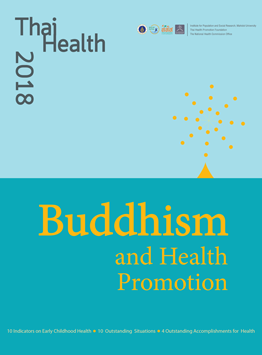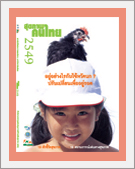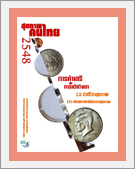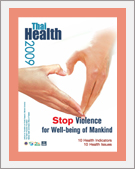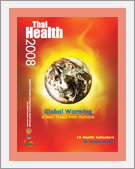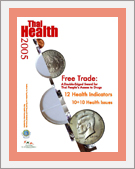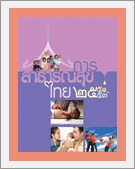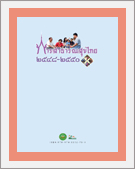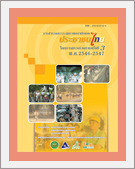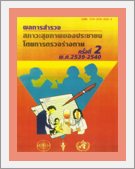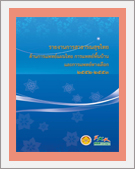

Buddhism and Health Promotion
10 Indicators on Early Childhood Health
10 Outstanding Situations
4 Outstanding Accomplishments for Health
It is projected that Thailand will become a complete aged
society in the year 2021, at which time the proportion of
the population age 60 years or older will reach 20% of
the total. As Thai fertility has fallen below replacement
level, the proportion of the working age population has
declined apace. Thus, it is imperative that Thailand build
human capacity at all levels of the population. Childhood
is the period of life that is marked by the most rapid
development of the body, mind, intellect, and knowledge.
Adequate care and quality development during
childhood establishes the foundation for a secure future
life, for the individual and for society at-large. This document
on Thai health is divided into 10 Indicators on Early
Childhood Health. The purpose of this document is to
display the status, data and statistics in order to judge the
success and remaining challenges for Thailand in promoting
health and quality of life for the youngest generation as
investment in the future of society.
The ten health milestones featured in this report echo the same ten highlights presented in the 2017 edition, and are
as follows: (1) The Chakri King Journeys to Heavenly Abode, Instills Forever in our Hearts; (2) Run to raise funds: Betong
to Mae Sai; (3) Reform of the National Health Security Act and the Thai Health Promotion Fund Act: Assessment of the
Constitutional Impact; (4) The 2017 Infant and Young Child Food Marketing Control Act A Preliminary victory for Thai
mothers and children; (5) 2017 Tobacco Products Control Act Another step forward for Thai health; (6) The Thai Welfare
Card: Is it Really Inclusive Growth; (7) Development of Traditional Thai Medicine and Natural Healing Methods; (8) EEC:
Don’t Neglect the Grassroots Economy; (9) The Poisonous Case of the Rice-pledging Scheme:Revisiting Government
Corruption; and (10) NCPO Reform of the Country: Will this Overlook the Dream? The four health achievements for the
Thai population include the following: (1) UNESCO Honours His Majesty King Rama IX ; (2) WHO Praises the National
Health Security System of Thailand for Covering Home-based Kidney Dialysis; (3) Praise for Thai Leadership in Addressing
Non-communicable Disease; and (4) Thailand Health Promotion Fund (THPF): Receives the award for the “No Tobacco
Day” as a Good Governance Honour.
The special theme in this year’s report is a focus on the role of Buddhist principles and teaching in promoting a healthier
population in the context of a rapidly changing society. The evolution of society is changing norms and lifestyles,
especially among the younger generation. Thus, the question posed in this report is as follows: “Does Buddhism still
have a role to play in today’s society?” This report also explores the potential links between Buddhism and health
status. A profound understanding of this linkage requires a review of how Buddhism became an integral part of Thai
society. This report also reviews the connection between the core principles and discipline of Buddhism, i.e., the
Dharma, as a guideline for comprehensive healthy living, with a focus on the dimension of the mind as a basis for
physical, intellectual and social contentment. These principles should help everyone see reality of the situation as it
relates to natural law, and conduct their lives accordingly, with awareness, regardless of their circumstances, nutrition,
and behavior, etc. This text explores how strategies of Buddhist thought can create a social consciousness, and the
role of the Sangha and monasteries in health promotion. This integration can occur in such common events as Buddhist
novice ordinations, the role of the Wat (i.e., Buddhist monastery) in the community, and role of the Buddhist
adherents themselves. Finally, this volume concludes that Buddhism is a promising avenue to build the health of
the population, in one way or another, at one level or another, depending on the direction this national community
of Buddhists wants to go.
| Prepared by | Institute for Population and Social Research , Mahidol University | |||
| Supported by | Thai Health Promotion Foundation
The National Health Commission office |
